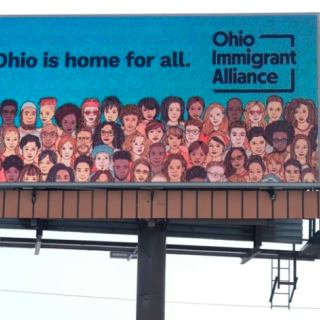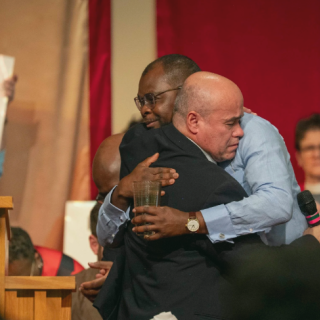Advertisement
Asawin Suebsaeng at Rolling Stone is out with a vital article that explains who Ayman Soliman is to his friends, community, and the families at Cincinnati Children’s Hospital — and why the government’s “case” against him isn’t a case at all. See excerpts below and read the full piece.
The kind of person Ayman is
Whatever your faith or beliefs, he would have consoled you and your family in your darkest hours, in the kind of moment that every parent lives in abject terror of ever having to face….One former colleague of the imam recounts that specifically because of Soliman, there are poor members of the community who did not need to worry about paying for the funerals of their babies who didn’t make it out of the hospital alive.
Tala Ali, Clifton Mosque chairperson and Ayman’s good friend recounts how the chaplain would console the incarcerated: “There was someone in another block there, facing criminal allegations, who wanted to see a chaplain, and Ayman wasn’t able to see them, but behind a wall and door, the two of them talked for an hour.”
Multiple associates say that Soliman has told them recently that if he gets out and is allowed to remain in Ohio, he wants to go back regularly to this Butler County jail to help as a chaplain.
Since his July 9 arrest, Rolling Stone spoke to numerous individuals — legislators, activists, those who worked with him at Cincinnati Children’s, attorneys, longtime Jewish, Muslim, and Christian residents of the area, family members of sick kids who got to know Soliman — familiar with this man and his local work, in and out of the medical center. None of them can square what Trump’s government is claiming, that this imam is a potential national-security threat who needs to be jailed then deported, with the person they know.
“If he’s a terrorist then he’s the worst terrorist imaginable; he’s a bullshit terrorist. He’s very bad at his job then,” says Rev. Elizabeth Diop, who until recently worked as a fellow chaplain at Cincinnati Children’s. “Every word that you’ve read about him from people who know him is a true word. He would do anything for you. Even in fucking detention, he’s counseling people who are locked up right now. He’s providing spiritual care; he’s the chaplain of his unit right now. He needs to be alive. He’s got work to do here, he’s got work to do to help heal the world.”
Diop says she was recently fired from the hospital after speaking to a local news outlet and thus apparently violating the medical center’s strict rules on granting unauthorized interviews to the media. She says she doesn’t regret her decision and that she feels compelled to keep speaking out publicly in support of Soliman.
“Ayman’s worth it. I lost my job, I kept my soul,” she says.
Why the government’s case against him is so weak
“The group that Mr. Soliman worked for is not connected to the Muslim Brotherhood, is not a terrorist organization, and does in fact provide charitable works in Egypt,” Robert Ratliff, one of his lawyers, said this week. Soliman’s team previously stated that “he faces death if forced to return to Egypt.”
“The Department of Homeland Security [on Tuesday] did not present any evidence in court to support its claim that Ayman provided material support to a terrorist organization,” Nazly Mamedova, another attorney for Soliman, writes in a statement to Rolling Stone.
“Furthermore, in the updated Notice to Appear (NTA), DHS removed any reference to Ayman providing such support,” she continues, adding: “We hope that the immigration judge will reject the government’s baseless accusations and grant Ayman’s release on bond while his proceedings continue.”
Soliman, who has been living and working in the U.S. and seeking citizenship for more than a decade, has long maintained that he faces serious danger, or death, from Egypt’s repressive government if he’s sent back. He, his advocates, and his legal team say that the federal claims of “terrorism” or Muslim Brotherhood connections are possibly or in part rooted in a case of mistaken identity, an assertion Soliman has already attempted to hash out in court.
Close associates of Soliman raise the point that it would be bizarre for an actual terrorist operative to, by his own accord, file a lawsuit challenging the FBI on the terror-list flags, because that would draw more public attention to himself and his activities.
What Ayman means to the families at Cincinnati Children’s Hospital
One of the people most intimately familiar with the imam’s work is Marc Zumhagen, an ex-colleague of Soliman’s and formerly a longtime overnight chaplain at Cincinnati Children’s. “I worked with Ayman every day and we would get coffee several times a week,” Zumhagen says in an interview with Rolling Stone, adding that “conservatively,” he would estimate that Soliman worked on cases involving “15-30 deaths of children every year.”
When asked what kind of man Soliman is, and what his work meant to people who came through or staffed the hospital, Zumhagen tells the story of one child, about eight-years-old, who was at Cincinnati Children’s in the latter half of the Biden era. Zumhagen had also been in the room for much of this family’s horrific ordeal.
According to Zumhagen, following a terrible condition, subsequent infections, and procedures that weren’t working to save the kid’s life, the parents were, of course, in a miserable state as their child was “on the verge of death.” As the parents attempted to figure out what to do, the doctors and medical staff presented the family with a choice: They could authorize “very drastic treatment” with likely little hope of success, or they could end care.
It was the middle of the night. “That’s when I called Ayman,” the hospital’s former overnight chaplain recalls, as “these parents feel like they’re holding a gun to their own kid’s head.”
Zumhagen says, “I believe they were a Muslim, Arabic-speaking family, and the look of relief on the family’s face when Ayman came in was instant. Sometimes, when you’re in that room sitting with the doctors, it can feel hostile, just in the way you’re seated, even if it’s of course not meant to. But Ayman had this remarkable way of coming in and sitting next to the family, even if he had to move furniture. He just had this way of connecting with the family, and translating things between the doctors and family in perfect Arabic.”
At that moment, as the family was weeping and agonizing over their decision, Zumhagen says that the parents wanted to “know what Islam says about this.” Then, not long after, came a point “where the conversation shifted and both parents both nodded their heads and there was this moment of peace in the room.” Zumhagen says he asked Soliman later what they discussed, and his friend said the parents asked “if Muhammad ever faced anything like this.”
Soliman then reminded the family about the suffering Muhammad endured, as told in the pages of the Quran, and how awful it is to see a child go through such suffering. He reminded the family that ultimately, it’s not up to us: Some things are just “in Allah’s hands now and Allah has a path at the end of the day.” He assured the family that they would not be bad parents for not wanting their child to suffer anymore, and that they could make the decision not to pursue likely doomed, extreme measures and instead spend these last hours of the child’s life peacefully.
The family decided to withdraw care, Zumhagen says. “He gave them peace,” he adds. “I was there to take the patient to the morgue after, and Ayman stayed there to comfort the family the whole night, including by making sure food arrangements were taken care of for them, so they did not have to worry about that … I know he remained in touch with them, and followed up with them, because they wanted their child to be buried back home, so he had to work with the international liaison and funeral homes.



